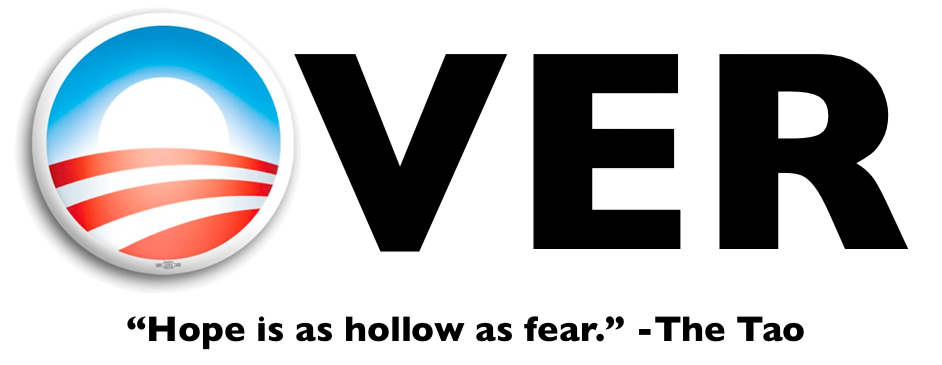 Barack Obama told us he’d CHANGE America. During the campaign, when Obama was asked about the CHANGE he would bring to Washington, he didn’t describe specific policies or proposals as much as he asked us to HOPE for the CHANGE. The Tao Te Ching says that “hope is as hollow as fear.” It appears Obama’s CHANGE is also hollow.
Barack Obama told us he’d CHANGE America. During the campaign, when Obama was asked about the CHANGE he would bring to Washington, he didn’t describe specific policies or proposals as much as he asked us to HOPE for the CHANGE. The Tao Te Ching says that “hope is as hollow as fear.” It appears Obama’s CHANGE is also hollow.
Why is hope as hollow as fear? Because hope and fear both come from thinking about the future Self. If an individual thinks that things will get better, they feel hopeful, if they think things will get worse, they become fearful. HOPE did not ask us to be the change we want to see in the world. It asked us to dream about a future with President Obama. If we want authentic, evolutionary change to take place in America, we need to act.
Evolutionary change is rooted in ancient truths, spreads through informal channels and is applied in the most unlikely places, far from the glamour of the conventional and mainstream. When the change emerges into the popular consciousness, it doesn’t come packaged in a CNN Special or a New York Times commemorative coffee table book, it comes from unconditioned voices protesting a taboos that makes the experts uncomfortable.
One of the reasons it’s so difficult for evolutionary change to insert itself into culture is that evolutionaries find it difficult participating in conventional conversations which are based upon assumptions they disagreeable with. Gay marriage is a perfect example. A progressive will argue that the government should recognize any two individuals who want to marry while a conservative will say the government should only recognize marriages between a man and a woman. An evolutionary would deny the government the right to recognize marriages. Why would government – the people with the right to the legitimate use of force – be informed of an individual’s marital status, must less authorize people to change that status. The answer to this questions leads to much more significant ones about our government’s state of Constitutional noncompliance and the intrusive nature of the income tax, among others.
When evolutionary topics enter the mainstream media narrative, not only does a web of new questions emerge, but so does a world of new possibilities. It’s like the scene in the Wizard of Oz when the curtain is pulled and the wizard is revealed as a normal man using a powerful machine. Our natural reaction to the man behind the curtain is curiosity: who this man is, what does he want and what can his machine do?
In America, the people ‘behind the curtain’ work very hard to keep us inundated with never-ending debates, pointless news, meaningless art, disposable products, and futile projects that make it difficult to become aware of evolutionary perspectives. They don’t do this because they want to suppress us: they do it because they want to suppress themselves. By lying everyday to earn money and privileges that fill their ego’s with the phantom of ‘success,’ they get their vengeful reward – Vengeful because they view themselves as the victims. From their perspective, they haven’t been victimized by the neoloiberal economic paradigm, but by other individuals who have robbed them of their dignity. The theft may have occurred in a playground decades ago or it might take place everyday at home or at work but their need to control their environment comes from an inability to control themselves. Homes, clothes and cars that signal outward ‘power’ often signal inner weakness. That weakness comes out on the nights and weekends when the mind wanders away from work and ‘success’ and into its dark recesses containing more fundamental questions about competency. Did I do a good enough job? Was my text message too revealing? Should I have said that to my father? These questions all stem from one root: did I do the right thing? It takes a leap of faith to ask the question honestly enough so it can actually be addressed: Did I do the Right thing?
It’s a spiritual question and it requires a spiritual answer. What is that answer?
Welcome to humanity…